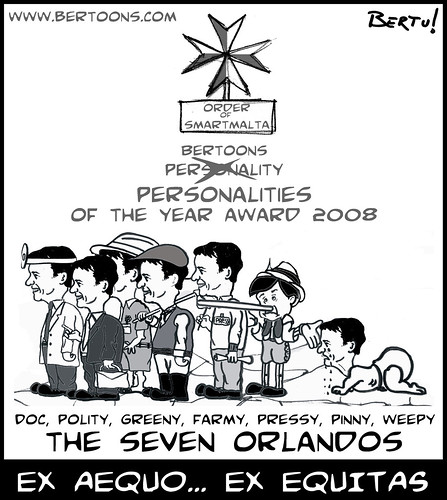 What better way than an historic footballing phrase to end this round of MEP elections that was characterised by a peppering of footballing jargon. I was told that I was still very pedantic in my posts (thanks markbiwwa) so I shall give you the bullet point view. Better still let’s do it pagelle style sticking to the footballing metaphor for a little while longer.
What better way than an historic footballing phrase to end this round of MEP elections that was characterised by a peppering of footballing jargon. I was told that I was still very pedantic in my posts (thanks markbiwwa) so I shall give you the bullet point view. Better still let’s do it pagelle style sticking to the footballing metaphor for a little while longer.
Final Result It dragged on for over 72 hours. We finally got a result. The fact of the matter is that the result was already there in the sealed ballot boxes before the counting began. Malta had voted with a significant downturn (80,000 non-voters) and the result was only waiting to be unveiled. It would be a laborious process made even more laborious by the fact that the two main parties were short of counters: the effect? Less agents to allow the skeleton crew to monitor every step. The PLPN system continues to debilitate our way of doing politics – down to making the smallest electorate’s decision the longest one to be read. Don’t get me started on ballot boxes abroad. Verdict: SLOW
Non-European I’ve tackled it elsewhere. There is nothing European about our MEP vote. The voters were dragged into another partisan sling-match and this resulted in a chain reaction of events that gave us most of the types of votes (see below). Interestingly you can compare the victorious Renzi’s approach to the result and that of Muscat. The former painted a red map of Italy – his first reaction was similar to that of our premier (we will not let this go to our heads), the second was to rush to Brussels with a clear message: this is a vote for change in Europe. The Maltese vote was absolutely not concerned about spreading representation in the European parliament for Malta’s best interests. It was all about “winning” over the eternal opponents. Verdict: ISLANDERS
Winners & Losers: There can be only one. That is the mantra that is sold time and time again when time comes for choosing representatives. This is the real winner takes all mentality that should not be translatable at a European level since we are choosing who represents us within the formations that make up the European Parliament. Instead we had the PM pouncing on polls and setting the target on an electoral “win” translatable in votes obtained while the opposition fell for the trap and accepted the challenge to a large extent. In the end, the “gain” for the Maltese is measured in how well represented they are in the European Parliament – at 3-3 it’s a draw between the Popular Parties and the Socialists. No Green representative yet again. At most if you really want a result it’s a resounding draw. Verdict: NO EXTRA TIME
Naming the votes: The ballot sheet had to be reprinted because of the Engerer debacle. More expense to the voters and a chance for more charades at partisan level leading to the infamous “suldati tal-azzar”. The alphabetical order gave us the “donkey vote” – unlike the one in Shrek this one is not funny and rather mechanical. Combined with the siege mentality born of partisan votes it meant that most times vote inheritance could be – to a certain extent – predicted. Bar the “protest vote” of course. Discounting the firmly convinced AD and Imperium voters you end up with a number of undecipherable cross-votes switching from right and left of the spectrum with an undignified nonchalance. Even the comical Zaren tal-Ajkla garnered a thousand plus votes that probably did not have the main parties laughing as much as the bored counters in the counting hall. Verdict: STICKS AND STONES
Racist Alarm: It’s a huge wart on these election results. Lowell bowed out rather late in the day having summed over 7,000 votes. You cannot see anything other than a warning sign in this. The intolerant vote is not one to be toyed with and the main parties are duty bound to tackle this head on without much ado while setting aside their partisan approach. Muscat’s final pre-electoral speech did woo the anti-immigrant lobby with much talk about standing firm – his record in this field is still not convincing when it comes to really understanding the humane approach – thankfully the warning signs were lit across the continent so there might be a renewed sense of cooperation among European leaders across the board. Verdict: SHAMEFUL
Simon Busuttil: The gun was jumped early in the vote count. The first result – the numerical one – was devastating for the PN. Many elements within the PN were as quick to speak of “defeat” as the elements in the PL were prepared to speak of “victory”. The after effects of the Busuttil vs Muscat bout were reaped at this moment – strike while it is hot. So on Monday and most of Tuesday the question put to Simon Busuttil was “Will you resign?” I do have the benefit of hindsight but it would have been much better for the the PN leader to wait until the sixth seat was finally decided before pronouncing himself on the matter. It’s all so different now that Comodini Cachia will be filling the last spot. Had the message been drummed earlier on about what constitutes a real victory in European terms there would not be so much of a conundrum within the PN. Sure, there is work to be done and it has to be done yesterday but given the starting point, the proximity of last years general election and the resources of the current PN the three-three draw is anything but a defeat. Verdict: SURVIVOR
The ladies: A pleasant aspect of the end result is the majority of women that will be flying up to Brussels and Strasbourg. Four out of Malta’s six MEPs are women. They deserve to be there in the same way as any other candidate deserves to be there. I am glad that this is a pleasant aspect of the outcome. It would be amiss though to not analyse this vote just like any other labelled vote. For a long time early in the counting process we heard about the Gozitan vote having an effect for example. There seems to have been some form of slight cross-voting between parties from women candidate to women candidate which cannot be ignored. Even if we grant that the last two (Mizzi and Comodini Cachia) benefited from the donkey vote in their own way there is still an acknowledgement to be made that women candidates found some special favour among the electorate (even within the labyrinth of partisan and protest voting). We cannot ignore the fact that women candidates could have been chosen over their male counterparts in an effort to provoke a different kind of change in the way politics is done. When I said it is a protest vote I meant a protest against the politics we have had until now dominated by male figures. If you like (prefer) call it a vote for change. Applaud it I will but in the end, as someone else has already commented, if they end up parroting their parties and allowing partisan politics to trump real representation then this change will not count for much. Verdict: A BREATH OF FRESH AIR
There’s much more to be said but I’ll leave these handful of points for your perusal. A plus.


